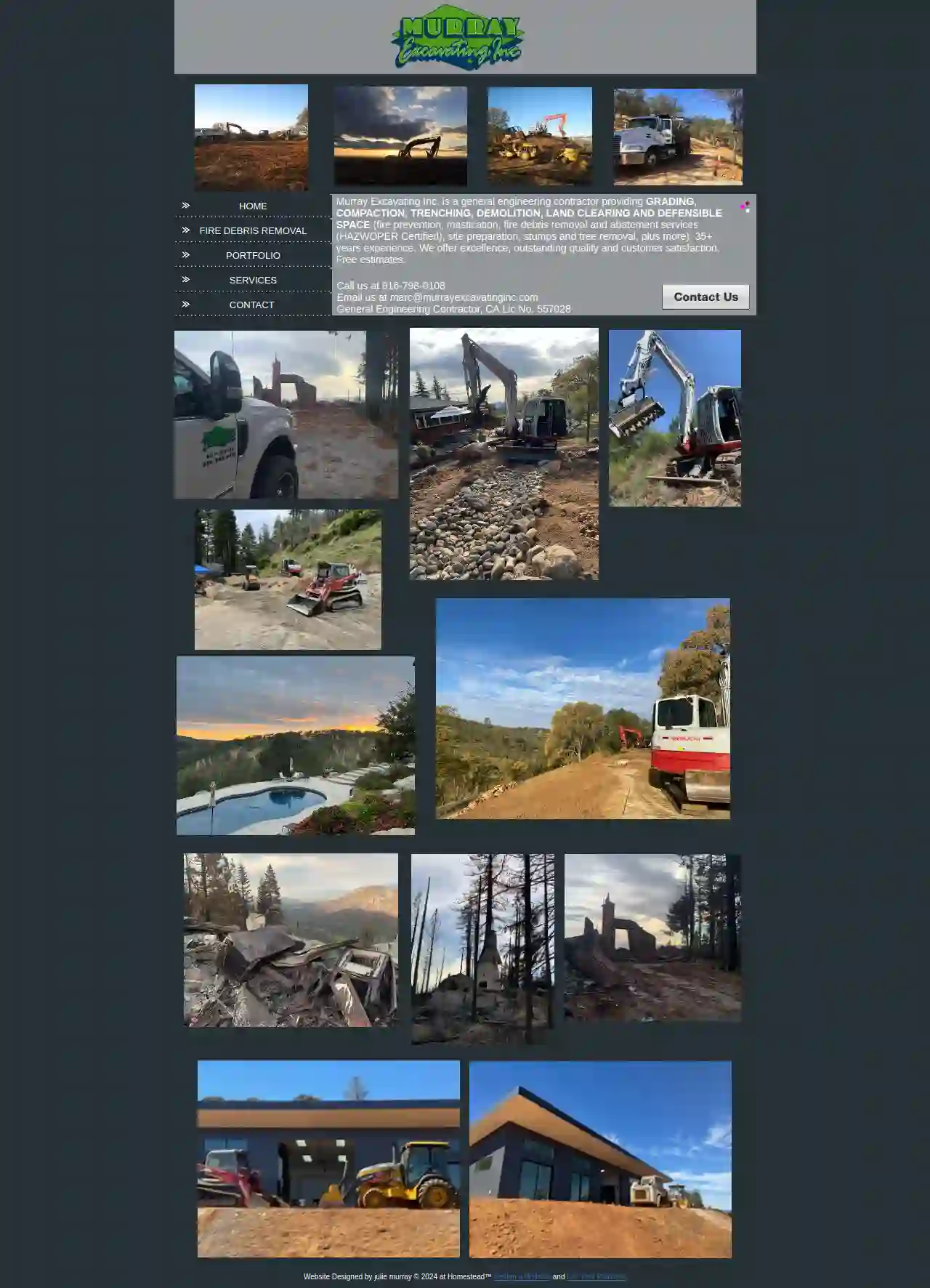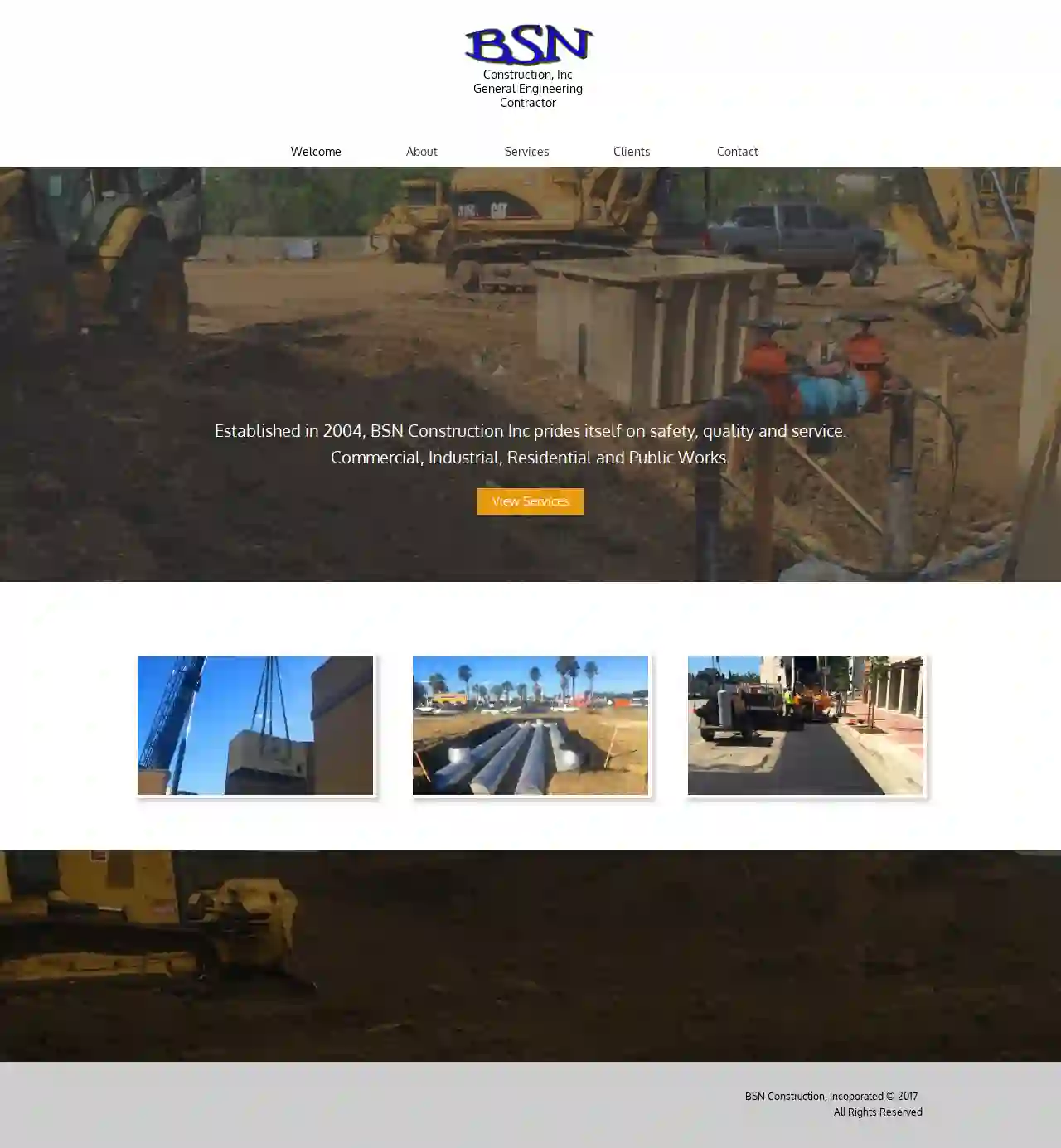Dirt Contractors Stockton
Find the best Dirt Contractors in Stockton
Get multiple Dirt Contractor quotes for your project today! Compare profiles, reviews, accreditations, portfolio, etc... and choose the best service.

Excavating Contractor Los Angeles
59 reviewsLos Angeles, USWelcome to Bobcat Excavating Services Los Angeles As an excavation services and bobcat services provider in Los Angeles, we at BSLA – Bobcat Services Los Angeles help our clients with any processes that involve removal of earth from the ground, transfer of earth from one site to another, backfilling of earth to previously excavated spaces, and modification of sites to suite various clients’ needs. Are you building or remodeling your outdoor space? Chances are that we can be of help. If you searched for “excavators near me” for you got to the right place! We are experts when it comes to excavation, bobcat services, compacting, filling and grading. We work on residential sites, commercial sites, and industrial locations. We are licensed and insured and all our machine operators are vigorously skilled in handling our heavy machinery and providing precision results.
- Services
- Why Us?
- Gallery
Get Quote
Applied EarthWorks
51 reviews1391 W. Shaw Ave., Fresno, 93711, USApplied EarthWorks: Ethical Consultants for Project Success Applied EarthWorks is a company with over 28 years of experience in cultural and paleontological resource management. We are committed to effective and affordable strategies that achieve progress and preservation, working together with our clients to ensure that projects are completed in a way that respects the environment and cultural heritage. We are certified by the California Department of General Services (DGS) as both a Small Business Enterprise (SBE) and a Small Business for Public Works (SB-PW).
- Services
- Why Us?
- Accreditations
- Gallery
Get Quote
Souza Construction & Electric
52 reviews586 So. Farmersville Blvd., Farmersville, 93223, USSouza Construction Inc. is a growing construction business, striving ever forward to become a premier general contractor. From our beginning as a “one-man show”, until our present state as a “multi-faceted” team, one thing has remained constant, a commitment to customer service. It is this commitment that has helped Souza Construction Inc. nearly double its sales every year for the last four years. We firmly believe that it will be this continuing commitment that will assist us in continuing this phenomenal growth pattern. Essential to this excellent service are our capabilities as a builder and a business. THE SOUZA COMMITMENT Souza Construction Inc. has committed itself to recruiting and training leaders in both the construction and professional world. Assembling a team of this caliber is not a quick or simple process, but requires diligent research, highly refined discernment, and continuous assessment. However, it is just this level of commitment and attention to detail that sets us apart. Souza Construction Inc. has made this our primary goal: understanding our customers and their needs, utilizing excellence in the field and in administration, and combining this with an unwavering commitment to customer satisfaction; this is Souza Construction Inc.
- Services
- Why Us?
- Testimonials
- Gallery
Get Quote
Bay Area Hydrovac
12 reviewsHayward, US- Services
- Why Us?
Get Quote
Murray Excavating Inc. Backhoe Service, Excavating and General Engineering Contractor
51 reviewsLatrobe, CA, 95682, USAbout Murray Excavating Inc. Murray Excavating Inc. is a general engineering contractor with over 35 years of experience, specializing in a wide range of services including grading, compaction, trenching, demolition, land clearing, and defensible space preparation. We are committed to providing excellence, outstanding quality, and exceptional customer satisfaction. Our team is HAZWOPER Certified and equipped to handle projects of all sizes, from small residential properties to large-scale commercial developments. We understand the importance of fire safety and have extensive experience in fire debris removal and clean-up. We have worked on major fire events such as the Caldor, Santa Cruz, NAPA, and Paradise Fires, providing comprehensive services that include debris removal, demolition, utility capping, and erosion control. Our goal is to restore your property to a safe and usable condition, while ensuring compliance with all federal and local regulations. Beyond fire-related services, we offer a comprehensive range of solutions for land development and improvement. Our services include brush clearing, mastication, fuel reduction, and land reclamation for various purposes such as recreation, grazing, access, and new construction. We are dedicated to helping you create a safe and sustainable environment for your property. Our team is equipped with a wide range of heavy machinery, including skip loaders, backhoes, excavators, masticators, mowers, dozers, compactors, and 10-wheelers, allowing us to handle any project efficiently and effectively. We are committed to providing our clients with the highest level of service and expertise, ensuring their complete satisfaction.
- Services
- Why Us?
- Gallery
Get Quote
Focus Utility Services
4.19 reviewsOakland, US- Services
- Why Us?
Get Quote
Golden State Concrete Construction
525 reviewsSacramento, 95827, USInstall Quality Concrete for Your Next Project Turn to us for concrete services in Sacramento, CA Contact Us Leave the Concrete Projects to the Pros Hire us for concrete services in Sacramento, CA Do you need a new driveway installed for your home? Or maybe you need to pour a foundation for a new build? No matter what the concrete project entails, we're here to provide some assistance. Golden State Concrete Construction offers concrete services throughout the Sacramento, CA area. From patios to pool decks, we can pour concrete for just about anything. You can trust that we'll bring your vision to life. Our team will be with you every step of the way. You can get a free estimate on our services by reaching out to a member of our local concrete company today. Driveway Replacement Foundation Concrete Flatwork Excavating Find out what we can do for you We proudly help our clients with all sorts of concrete projects. No matter how big or small the job is, you can turn to our local concrete company for services like: Driveway replacement services: We can replace the concrete driveway for your residential or commercial property Foundation pouring services: We can prep your property for a brand-new concrete foundation Concrete flatwork services: We can pour concrete for a new patio, pool deck or porch Excavating services: We can remove dirt, demolish structures or dig for a new concrete feature You'll be amazed at what we're capable of. To learn more about our concrete services, reach out to our team today. Build on a Stable Foundation Ask about our foundation installation services Contact Us Why choose Golden State Concrete Construction? When it comes to partnering with a concrete company, you can't go wrong with Golden State Concrete Construction. We pride ourselves on our 18 years of industry experience, quality of work and great attention to detail. Plus, we even offer discounts to veterans. Whether we're excavating for a driveway or pouring concrete, we'll ensure you're 100% satisfied with the job done.
- Services
- Why Us?
- Gallery
Get Quote
Fat Cat Excavation
4.211 reviews300 Marian Way, Roseville, 95678, USWelcome to Fat Cat Excavation, your trusted partner for residential and commercial construction in the greater Sacramento area. We are passionate about helping you build your dream with our extensive knowledge of outdoor living and construction experience. Whether you're envisioning a stunning pool, a beautiful patio, or a complete landscape transformation, our team is dedicated to bringing your vision to life. At Fat Cat Excavation, we pride ourselves on our commitment to quality, craftsmanship, and customer satisfaction. We believe in open communication, clear expectations, and delivering exceptional results that exceed your expectations. Contact us today to discuss your project and let us help you create the outdoor space you've always dreamed of.
- Services
- Why Us?
- Gallery
Get Quote
VC Construction
1Bakersfield, USAbout VC Construction Located in the beautiful mountain community of Tehachapi CA, Kern County, VC Construction first began as a sole proprietorship, owned and operated by Vic and Jopha Calanchini, licensed in the state of California in 2007 as a general building contractor, later adding on additional licensing in earthwork (C-12) and fencing (C-13). The company continued to grow and in 2013 the business was established as a corporation, now known as, Calanchini Inc dba VC Construcion, by owners Vic Calanchini, Pres./CEO and Jopha Calanchini, VP/Sec. VC Construction has built a reputation of quality work, making sure the job is done right the first time. We also deliver construction solutions that go beyond a finished project, giving our clients exceptional service. VC Construction takes a responsible approach to every project and is dedicated to bringing our clients maximum cost savings while minimizing the environmental impact at every stage of work. Our management team strives to complete projects punctually and ahead of schedule providing ideal outcomes for our valued clients. Safety is a must! VC Construction ensures a safe work environment by developing and enforcing comprehensive workplace practices. Every employee, staff and crew members are required to attend safety meetings, training programs, and be familiar with OSHA safety regulations. VC Construction prides itself by our creativity, to think "outside of the box", and to deliver winning solutions for our clients. Our work is our art and we demonstrate that by showing attention to detail, and giving the highest quality behind every client account and company project.
- Services
- Why Us?
- Our Team
- Gallery
Get Quote
BSN CONSTRUCTION, INC
1Suite 200, 1000 Old Country Rd, Garden City, 11747, USBSN Construction: Your Trusted Partner for Quality Construction BSN Construction is a family-owned and operated business with over 20 years of experience in the construction industry. We are committed to providing our clients with the highest quality construction services at competitive prices. We specialize in a wide range of construction projects, including residential, commercial, and industrial. We are also a licensed and insured contractor, so you can rest assured that your project is in good hands. We understand that building or renovating your home or business is a big decision. That's why we take the time to listen to our clients' needs and work with them to develop a plan that meets their specific requirements. We are also committed to providing excellent customer service and keeping our clients informed throughout the entire construction process. If you are looking for a reliable and experienced construction company, look no further than BSN Construction. We are confident that we can provide you with the quality construction services you need to make your project a success.
- Services
- Why Us?
Get Quote
Over 3,943+ Excavation Businesses on our platform
Our excavation pros operate in Stockton & surroundings!
ExcavationHQ has curated and vetted the Best Excavation Contractors in Stockton. Find a top & reliable pro today.
Frequently Asked Questions About Dirt Contractors
- Efficiently Spread and Level Dirt: Using specialized equipment like bobcats or skid steers to ensure even distribution and proper compaction.
- Achieve Precise Grading: Following specific grades and contours for drainage or construction purposes.
- Handle Large Volumes of Dirt: Managing large deliveries and removals with dump trucks and other heavy machinery.
- Minimize Risks and Ensure Safety: Working safely and efficiently, reducing the potential for injuries or property damage.
- Environmental Site Assessment: Hire a qualified environmental consultant to conduct a Phase I Environmental Site Assessment (ESA). This involves reviewing historical records, conducting site reconnaissance, and interviewing relevant parties to identify potential environmental concerns.
- Soil Sampling and Testing: If the ESA indicates potential contamination, soil samples will be collected and analyzed in a laboratory for the presence of specific contaminants, such as heavy metals, pesticides, or petroleum products.
- Clearly Define Your Project Scope: Provide the contractor with detailed information about your project, including the size of the area, the type and volume of dirt needed, the desired grading or leveling, and any specific requirements.
- Obtain Multiple Quotes: Request quotes from multiple reputable dirt contractors to compare prices, services, and experience. Ensure the quotes are comprehensive and include all project details.
- Verify Licensing and Insurance: Confirm that the contractor has the necessary licenses, insurance coverage, and a good safety record. This protects you from potential liabilities.
- Communicate Openly and Regularly: Maintain open communication with the contractor throughout the project, addressing any questions, concerns, or changes promptly. Regular updates and site visits can help ensure everything is on track.
- Document Everything: Keep written records of all communication, contracts, quotes, and invoices for reference and accountability.
What is the difference between screened topsoil and unscreened topsoil?
Screened Topsoil: Processed through a screening machine to remove large debris, rocks, and clumps, resulting in a finer and more uniform texture. It's generally considered higher quality and is preferred for landscaping, gardening, and lawn establishment.
Unscreened Topsoil: Not processed through a screening machine and may contain various sizes of debris, rocks, and clumps. It's typically less expensive than screened topsoil but may require additional work to remove debris before use.
Choosing between screened and unscreened topsoil depends on your project's specific needs and budget.
Can I spread dirt myself, or should I hire a professional?
How do I know if the dirt I need is contaminated?
What are some tips for working with dirt contractors?
What is the difference between screened topsoil and unscreened topsoil?
Screened Topsoil: Processed through a screening machine to remove large debris, rocks, and clumps, resulting in a finer and more uniform texture. It's generally considered higher quality and is preferred for landscaping, gardening, and lawn establishment.
Unscreened Topsoil: Not processed through a screening machine and may contain various sizes of debris, rocks, and clumps. It's typically less expensive than screened topsoil but may require additional work to remove debris before use.
Choosing between screened and unscreened topsoil depends on your project's specific needs and budget.
Can I spread dirt myself, or should I hire a professional?
- Efficiently Spread and Level Dirt: Using specialized equipment like bobcats or skid steers to ensure even distribution and proper compaction.
- Achieve Precise Grading: Following specific grades and contours for drainage or construction purposes.
- Handle Large Volumes of Dirt: Managing large deliveries and removals with dump trucks and other heavy machinery.
- Minimize Risks and Ensure Safety: Working safely and efficiently, reducing the potential for injuries or property damage.
How do I know if the dirt I need is contaminated?
- Environmental Site Assessment: Hire a qualified environmental consultant to conduct a Phase I Environmental Site Assessment (ESA). This involves reviewing historical records, conducting site reconnaissance, and interviewing relevant parties to identify potential environmental concerns.
- Soil Sampling and Testing: If the ESA indicates potential contamination, soil samples will be collected and analyzed in a laboratory for the presence of specific contaminants, such as heavy metals, pesticides, or petroleum products.
What are some tips for working with dirt contractors?
- Clearly Define Your Project Scope: Provide the contractor with detailed information about your project, including the size of the area, the type and volume of dirt needed, the desired grading or leveling, and any specific requirements.
- Obtain Multiple Quotes: Request quotes from multiple reputable dirt contractors to compare prices, services, and experience. Ensure the quotes are comprehensive and include all project details.
- Verify Licensing and Insurance: Confirm that the contractor has the necessary licenses, insurance coverage, and a good safety record. This protects you from potential liabilities.
- Communicate Openly and Regularly: Maintain open communication with the contractor throughout the project, addressing any questions, concerns, or changes promptly. Regular updates and site visits can help ensure everything is on track.
- Document Everything: Keep written records of all communication, contracts, quotes, and invoices for reference and accountability.